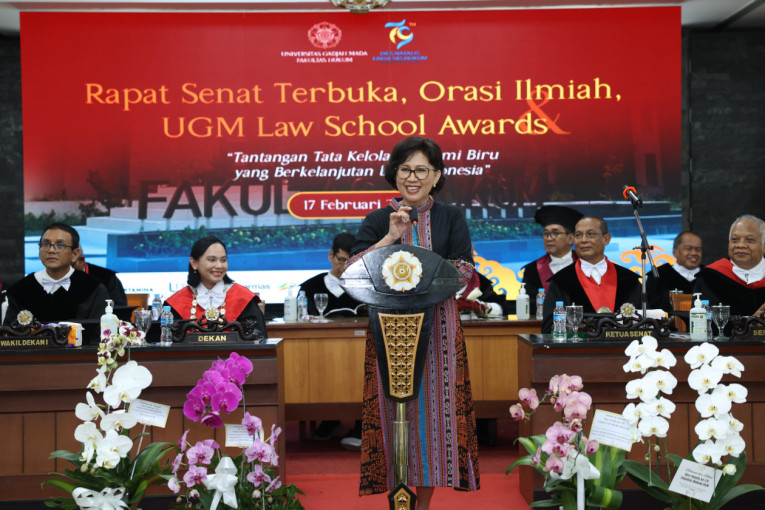
Indonesia is the largest archipelago in the world, with two-thirds of its territory comprising coastal and marine areas rich with various potentials.
The blue economy development concept plays a key role in ensuring a sustainable future for this region.
The government has committed to expanding five key export commodities—shrimp, seaweed, tilapia, lobster, and crab—to improve the welfare of 140 million people in coastal areas.
However, the management of marine and fisheries resources, particularly rights-based governance for fishers and entrepreneurs, remains a major unresolved issue.
The Rector of Universitas Gadjah Mada, Professor Ova Emilia, emphasized that the Faculty of Law at UGM (FH UGM) is expected to address the challenges in the governance and legislation of sustainable blue economy policies in Indonesia.
She noted that FH UGM could collaborate with international partners for strategic research partnerships, including developing a blue economy center of excellence as a follow-up to the Blue Economy training.
“FH UGM can conduct studies and research to ensure that these significant policy ideas are implemented in a fair, responsible, and sustainable manner,” said the rector during the peak celebration of the 79th Anniversary of FH UGM and the Open Senate Meeting on Monday (Feb. 17).

On this occasion, the rector expressed her appreciation and gratitude to the seniors, professors, and the entire academic community of FH UGM for their outstanding contributions to UGM’s tri-dharma of higher education.
“May this anniversary rekindle our spirit to continue contributing to education, research, and community service, especially to create balance and sustainability for nature in the future,” she concluded.
Dr. Dahliana Hasan, the Dean of FH UGM, stated that in its 79th year, FH UGM remains committed to delivering excellence in legal education in Indonesia.
This commitment is reflected in the accreditation achievements, including an excellent accreditation for the Doctoral Program in Law and the Master of Notary Program, five study programs with an A accreditation, and one program with a good accreditation.
Additionally, according to the 2024 World University Ranking by Subject, FH UGM climbed 20 places from 237th to 217th globally.
Meanwhile, in EduRank’s assessment of liberal arts and social sciences with a focus on law studies, FH UGM ranks second nationally and 126th in Asia.
“The number of students at all levels continues to grow each year, and even postgraduate admissions always exceed the targets set by the university,” she said.
The dean also mentioned that the faculty is enhancing the quality of its lecturers by encouraging their participation in various activities and organizations at the regional, national, and international levels. The faculty is also increasing the number of research projects and publications through journals, conference proceedings, and policy papers.
In 2024, 60 lecturers were involved in 8 regional organizations, 22 national organizations, 7 international organizations, and more than 11 international activities. FH UGM also received 245 research grants and 330 publications.
“As for the development of administrative staff, the faculty successfully conducted 4,140 hours of training, averaging 48 hours per staff member, exceeding the training hours target set by the university,” Dr. Hasan explained.

She added that FH UGM has also constructed a statue of Lady Justice in front of the campus, symbolizing the principles of objective and impartial justice in advancing the law.
“This is reflected in the community service efforts, which include providing legal assistance in the form of pro bono consultations and services, legal reviews with various partners, and the provision of expert witnesses for court hearings,” she added.
At the national level, FH UGM has forged collaborations with various partners, including ministries, regional governments, the private sector, and universities.
These include partnerships with the Ministry of Maritime Affairs and Fisheries to enhance institutional quality, PT Pertamina Persero for legal education programs, and the Yogyakarta High Prosecutor’s Office.
Internationally, they have collaborated with Glasgow University on a double degree program, Turnham Law School on a double degree program and data sharing, and the National University of Singapore on joint lectures.
FH UGM also strives to strengthen its relationships with alumni, especially in supporting students’ preparation for the workforce.
During the anniversary celebration, Professor Luky Adrianto, a professor of fisheries and marine science at IPB University, delivered a scientific oration. Professor Adrianto proposed the concept of the Blue Economy Development Index (BEDI) as a tool for measuring the success of blue economy implementation.
He presented this concept at the International Conference on Ocean Economy and Climate Change Adaptation in May 2022.
According to him, ecosystem-based marine economies should be a key strategic focus for archipelagic nations like Indonesia, integrating marine-based economies with inclusive human ecosystems.
“The key phrase here is regulating human behavior, and from that perspective, law becomes crucial. Therefore, we must increase the number of legal experts who understand maritime, marine, and archipelagic issues,” he explained.

He continued, stating that FH UGM plays a significant role in drafting regulations supporting the implementation of the blue economy.
The 13 principles of Ocean Governance transformation are highly relevant to shaping maritime legal policies, including protecting fishers’ rights, regulating exclusive economic zones (EEZs), and strengthening maritime conservation laws.
“With strong law enforcement, effective advocacy, and sustainability-oriented policies, the blue economy can bring great benefits to the environment and the welfare of coastal communities in Indonesia,” he said.
After the scientific oration, the event continued with the UGM Law School Awards presentation.
This year, FH UGM awarded three honors: Justice Defender, Contributing Alumni, and Sustainability Pioneer. Supreme Court Justice for Civil Chamber Nani Indrawati received the Justice Defender Award for her contributions to the formulation of anti-SLAPP (Strategic Lawsuit Against Public Participation) policies and environmental management.
The Contributive Alumni Award was given to Triweka Rinanti, who worked for the National Bank Restructuring Agency (BPPN) from 1998 to 2001.
Finally, the Sustainability Pioneer Award was presented to the Resan Gunung Kidul Community, a grassroots movement focusing on community-based water resource conservation.
Author: Triya Andriyani
Post-editor: Afifudin Baliya
Photographer: Firsto

